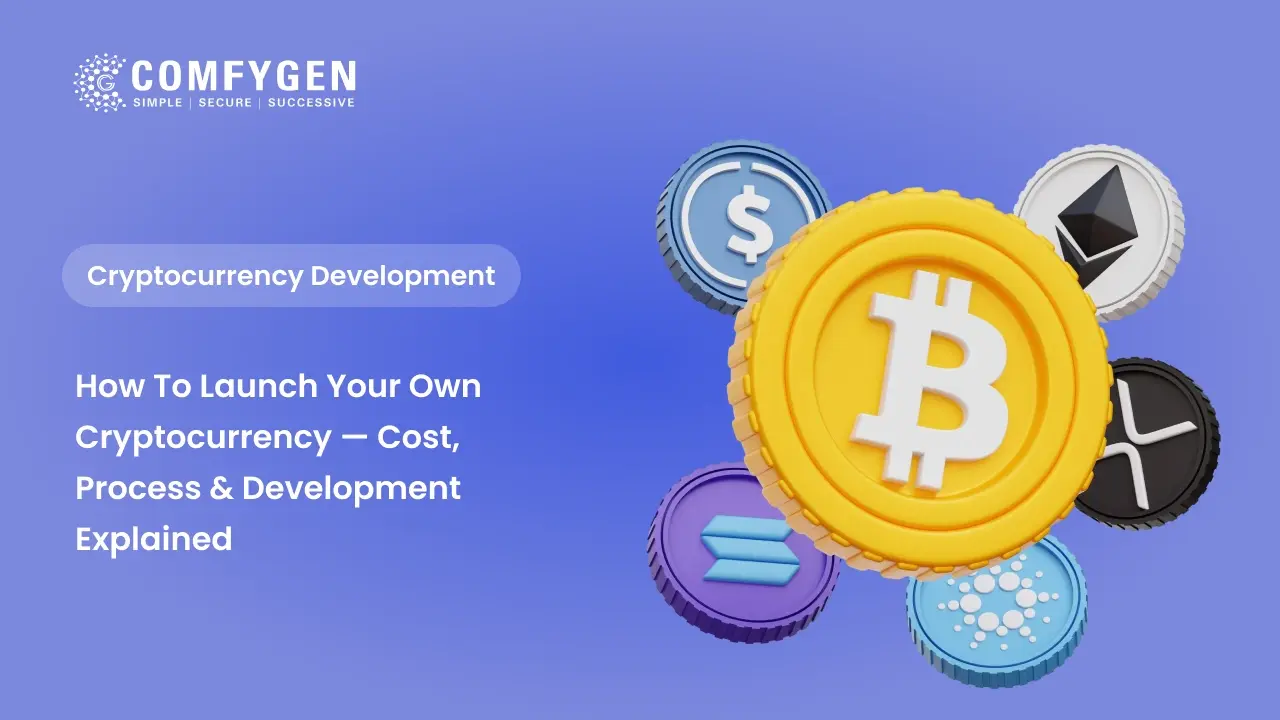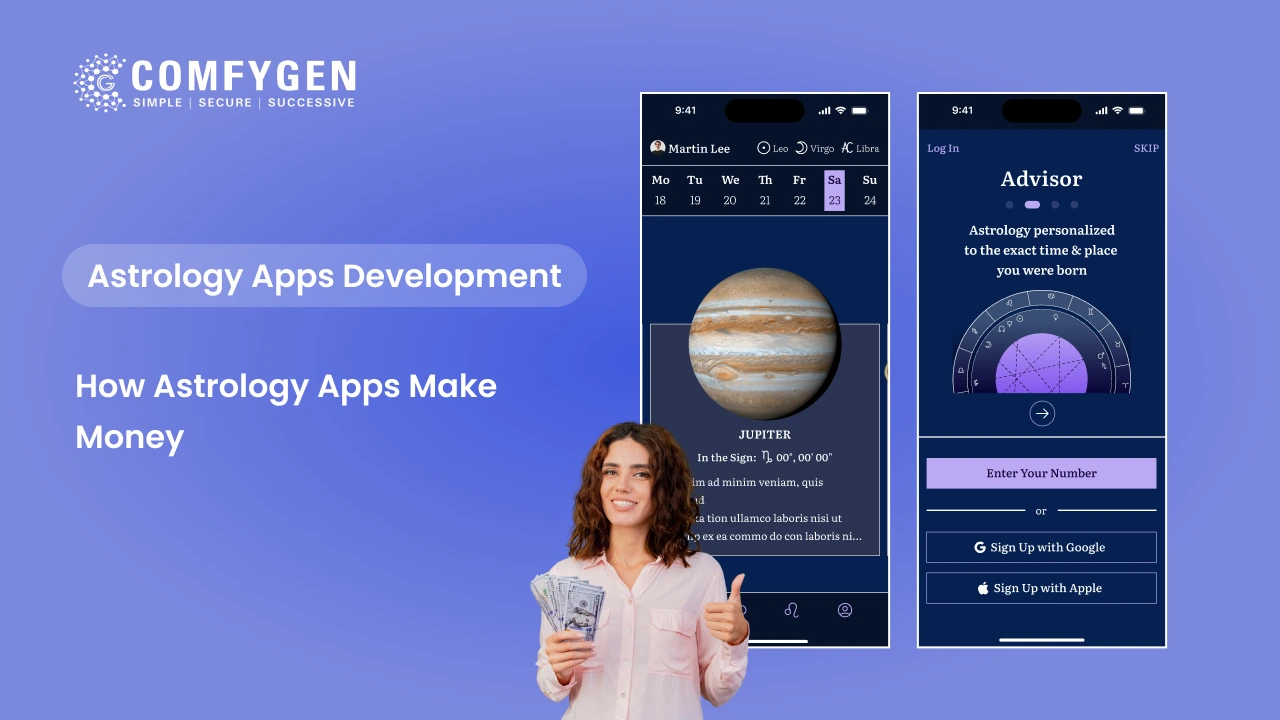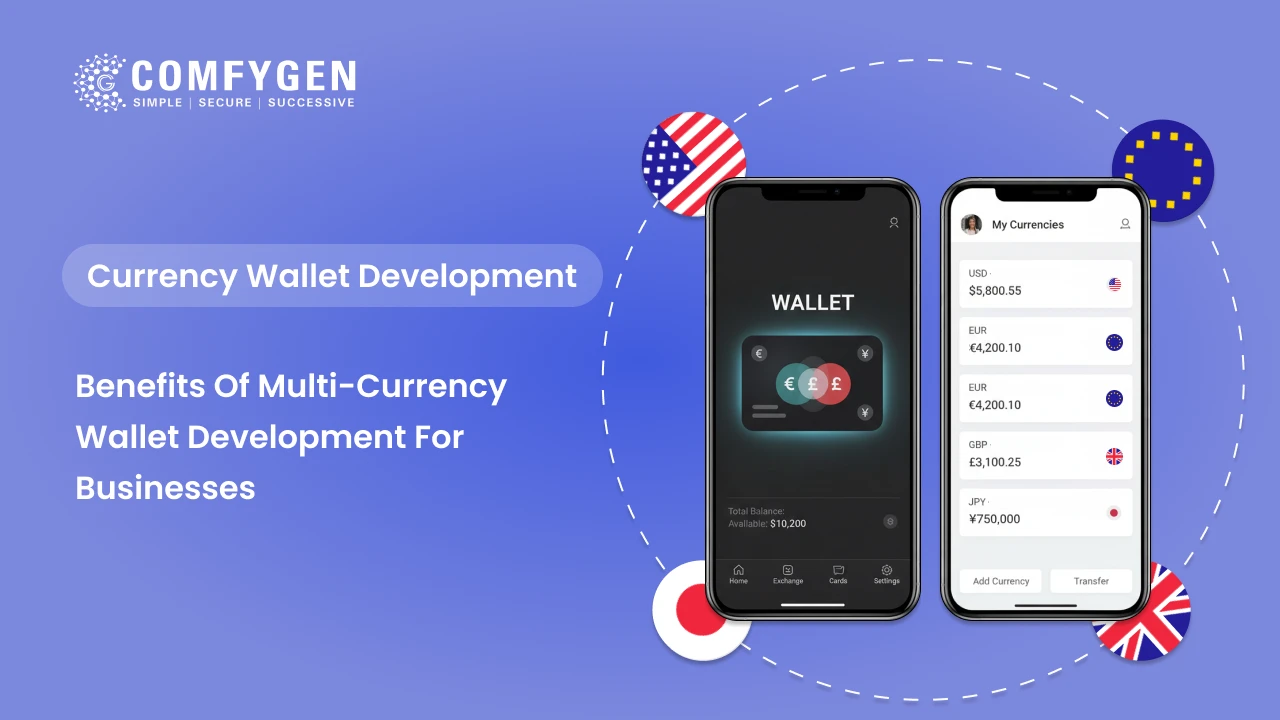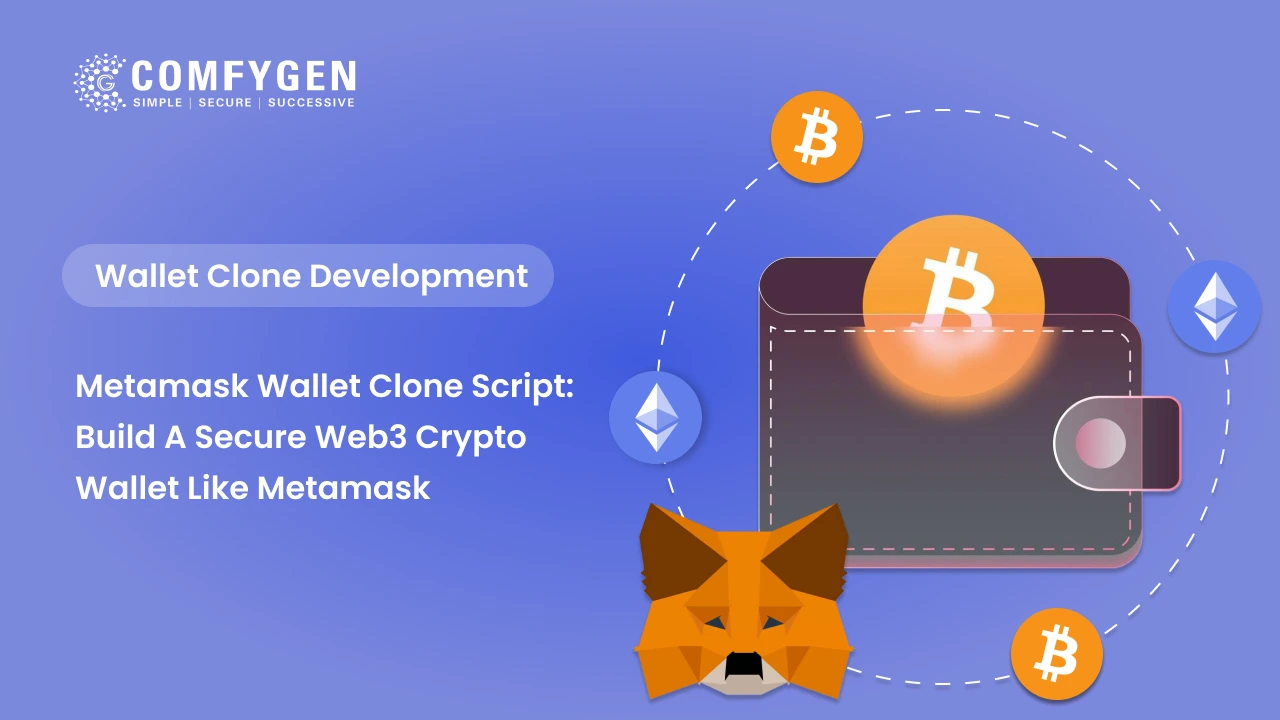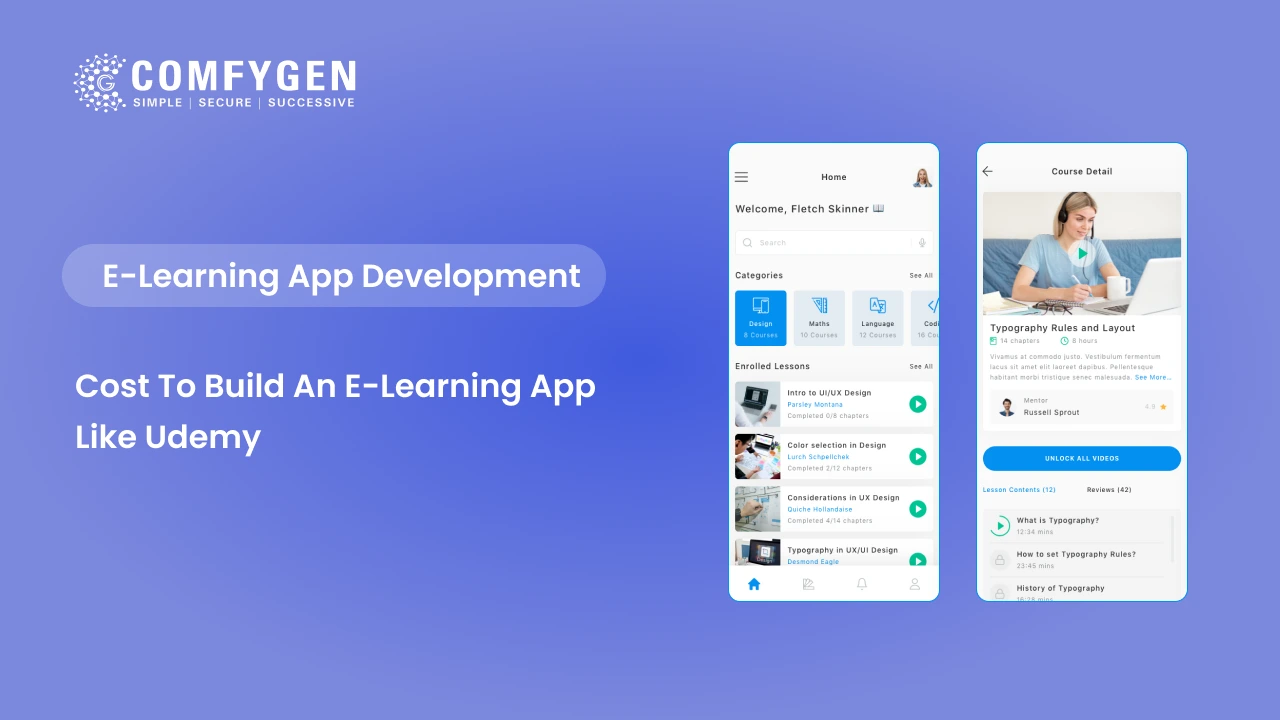How to Launch Your Own Cryptocurrency — Cost, Process & Development Explained
The first cryptocurrency Bitcoin was launched in 2009, marking the start of a financial revolution that changed how we think about money, trust, and new technology. What began as an experiment in decentralization quickly evolved into a global movement, giving birth to thousands of new digital currencies and blockchain-based projects.
Businesses and startups are looking to create their own cryptocurrency to power their digital ecosystems. From decentralized finance (DeFi) applications and gaming tokens to real estate and supply chain solutions, the possibilities are endless. A sudden increase in demand for cryptocurrency has made cryptocurrency development services one of the fastest-growing areas in blockchain technology.
Launching your own cryptocurrency, token, or coin isn’t just about technology. It’s about innovation and control of your digital asset. Entrepreneurs are leveraging custom crypto development to build brand-specific digital assets, attract investors, and introduce new models of community engagement. Whether it’s raising capital through ICOs or creating a native utility token for your platform, token creation for startups has become a proven way to grow and scale in the Web3 era.
Why Create Your Own Cryptocurrency?
Creating your own cryptocurrency isn’t a technology trend; it’s a basic requirement for a business to run profitably. Since the first wave of crypto market innovation, thousands of startups and enterprises have realized that launching their own coin or token can open entirely new revenue streams and customer engagement models.
When you create your own crypto coin, you’re not only building a digital asset, you’re establishing an ecosystem. Your cryptocurrency can represent ownership, utility, access, or even voting power within your business model. It gives users a reason to stay invested in your brand while giving you full control over how your blockchain economy operates.
From a business perspective, the benefits of cryptocurrency for business are substantial:
-
Brand authority: A token development instantly sets your business apart as innovative and future-focused.
-
Utility and engagement: Tokens can be used for payments, staking, loyalty rewards, or governance.
-
Fundraising opportunities: Through Initial Coin Offerings (ICOs) or IDOs, startups can raise capital without traditional financial intermediaries.
-
Community growth: A crypto project creates a loyal, active user base that grows your brand organically.
Types of Cryptocurrencies You Can Launch
Before you decide to launch your own cryptocurrency, you have to understand what type of digital asset, according to your requirements, a coin or a token. Both have different purposes, technical requirements, and costs, and choosing the right one will determine how your blockchain project performs long-term
1. Coins – Built on Their Own Blockchain
A cryptocurrency operates on its own blockchain network. Think of Bitcoin, Ethereum, or Solana; each has its own chain, related currency, and independent infrastructure. When you choose crypto coin development, you’re essentially building a new blockchain from scratch. This gives you complete control over how transactions, consensus mechanisms, and network governance work.
Best for: Enterprises or startups planning to create a fully independent blockchain ecosystem or launch a new Layer 1 protocol.
Use cases: Payments, decentralized applications (DApps), financial systems, and blockchain-powered ecosystems.
2. Tokens – Built on Existing Blockchains
Tokens are digital assets created on top of an existing blockchain like Ethereum, Binance Smart Chain (BSC), Polygon, or Solana. These are ideal if you want to launch quickly and minimize Token development costs. Through token development services, you can create ERC-20, BEP-20, or SPL tokens without building a blockchain from scratch.
Best for: Startups, entrepreneurs, and projects focusing on DeFi, NFT marketplaces, gaming platforms, or community utilities.
Use cases: Governance tokens, stablecoins, utility tokens, reward tokens, or fundraising assets (ICO/IDO).
3. Coin vs. Token: Quick Comparison
| Feature | Coin (Own Blockchain) | Token (Existing Blockchain) |
|---|---|---|
| Infrastructure | Independent blockchain | Uses an existing blockchain |
| Development Cost | Higher (complex architecture) | Lower (smart contract-based) |
| Launch Time | 4–6 months | 2–4 weeks |
| Maintenance | Full control, more resources | Minimal maintenance required |
| Scalability | Highly customizable | Depends on the host blockchain |
| Ideal For | Large-scale enterprises & tech projects | Startups & DeFi/NFT ventures |
Choose between a coin and a token depending on your budget and requirements. If you’re looking to innovate with full autonomy, go for custom coin development. If speed and affordability matter more, token development on Ethereum or BSC is your best route.
Step-by-Step Process to Launch Your Own Cryptocurrency
Building, designing, and launching your own cryptocurrency from scratch might sound complicated, but when broken into clear steps, it becomes a structured and achievable process. Whether you’re creating a custom blockchain coin or an ERC-20 token, following the right cryptocurrency development process ensures your project launches smoothly and securely.
Step 1: Define Your Project’s Purpose and Target Market
Every successful crypto project starts with a solid idea. Before diving into development, define why your cryptocurrency exists.
Is it for payments, DeFi, NFTs, gaming, or governance? Who will use it? A clear business model and defined user base help guide the entire crypto project development process and attract early investors.
Step 2: Choose the Right Blockchain Platform
Your choice of blockchain platform will determine your coin’s scalability, transaction fees, and security. Popular options include Ethereum, BNB Chain, Polygon, Solana, and Avalanche.
If you want full control of your digital asset, you can build your own blockchain. If you prefer faster deployment, go with a white label crypto development solution.
Step 3: Design Tokenomics and Supply Structure
Tokenomics defines how your cryptocurrency works that including total supply, distribution, rewards, and burning mechanisms. A balanced token economy encourages adoption and prevents inflation.
Plan how tokens will be allocated to investors, the team, community incentives, and liquidity pools. A transparent structure boosts trust during ICO or IDO campaigns.
Step 4: Develop Smart Contracts and Validate Code
Smart contracts are the backbone of your cryptocurrency. They define how your token behaves, handles transactions, and interacts with users.
Hire experienced cryptocurrency developers to write and audit your smart contract code using languages like Solidity or Rust. Security audits are crucial to prevent vulnerabilities and hacks.
Step 5: Testnet Deployment and Security Audits
Before launching publicly, deploy your cryptocurrency on a testnet. This helps identify bugs and optimize performance under real-world conditions.
Conduct multiple security audits and simulations to ensure your blockchain or token functions correctly. Address any vulnerabilities before going live.
Step 6: Token Listing and Community Launch
Once tested, it’s time to go live. List your token on decentralized exchanges (DEXs) like PancakeSwap or Uniswap, or apply for centralized exchange (CEX) listings later.
Launch your marketing campaign, grow your Telegram and Discord communities, and publish your whitepaper and website.
This stage turns your project from code into a real digital economy.
Step 7: Ongoing Maintenance and Updates
Launching is only the beginning. Keep your blockchain network secure and active with regular updates, community engagement, and new feature rollouts.
Monitor performance, track on-chain analytics, and plan partnerships to expand your token’s ecosystem. A successful crypto project launch becomes sustainable only through ongoing development.
Cryptocurrency Development Cost
The cost of cryptocurrency development starts from token creation to building a fully independent blockchain. The total expense depends on your project scale, blockchain network, cryptocurrency features, security, and developer expertise. Below is a detailed explanation and a clear cost comparison table for easy reference.
1. Blockchain Platform Choice
Your choice of blockchain has the biggest impact on cost.
-
Coin development means creating your own blockchain (like Bitcoin or Solana). This requires complex backend systems, validators, and network setup.
-
Token development, on the other hand, uses an existing blockchain like Ethereum, BNB Chain, or Polygon, making it faster and more affordable.
2. Features and Functionalities
A simple token for basic transactions costs far less than an advanced crypto coin with staking, DeFi, or NFT features.
3. Security & Legal Compliance
Smart contract audits, bug testing, and legal KYC/AML compliance are crucial. They add to upfront costs but protect against major post-launch risks.
4. Developer Expertise & Timeframe
Hiring an experienced cryptocurrency development company ensures code quality, scalability, and a secure infrastructure. Costs vary based on skill, project size, and completion time.
5. Post-Launch Maintenance & Support
Even after deployment, maintenance is vital for performance monitoring, version updates, and feature enhancements.
Cryptocurrency Development Cost overview
| Development Component | Description | Estimated Cost Range (USD) | Timeframe | LSI Keywords |
|---|---|---|---|---|
| Blockchain Platform Setup | Build a new blockchain or create a token on an existing network | $3,000 – $250,000+ | 2 weeks – 6 months | blockchain platform cost, create new blockchain coin, token development services |
| Smart Contract Development | Code and deploy token logic (ERC-20, BEP-20, etc.) | $2,000 – $10,000 | 1–3 weeks | smart contract coding, token creation guide, crypto development services |
| Wallet Integration | Mobile/Web wallet setup and connection | $3,000 – $15,000 | 2–4 weeks | wallet integration cost, crypto wallet setup |
| Security Audit & Testing | Smart contract audit, bug fixing, penetration testing | $5,000 – $30,000 | 2–3 weeks | crypto audit services, blockchain testing, smart contract validation |
| Legal Compliance (KYC/AML) | Regulatory compliance and documentation | $2,000 – $8,000 | 1–2 weeks | token compliance standards, crypto regulations 2025 |
| UI/UX & Web Development | Design dashboard, admin panel, and landing page | $3,000 – $10,000 | 2–4 weeks | crypto website development, blockchain UI design |
| Marketing & Launch Strategy | PR, whitepaper, exchange listing, community growth | $5,000 – $25,000 | 3–6 weeks | cryptocurrency marketing strategy, token launch promotion |
| Post-Launch Maintenance | Updates, support, bug fixes, and server maintenance | $1,000 – $5,000/month | Ongoing | crypto maintenance cost, blockchain support service |
Average Cryptocurrency Development Cost Overview
| Type of Development | Approximate Cost Range (USD) | Development Duration |
|---|---|---|
| Basic Token (ERC-20/BEP-20) | $3,000 – $10,000 | 2–4 weeks |
| Advanced Token (DeFi/NFT-ready) | $10,000 – $25,000 | 4–6 weeks |
| New Blockchain Coin Development | $80,000 – $250,000+ | 3–6 months |
Technical Aspects of Cryptocurrency Development
The technology stack you choose for cryptocurrency development. Every blockchain development operates on a unique combination of code, architecture, and consensus mechanisms, and understanding these technical layers helps ensure your crypto asset is scalable, secure, and functional.
1. Programming Languages Used in Crypto Development
The foundation of any crypto project lies in its code. The most widely used programming languages include:
-
Solidity – Used for Ethereum-based token development (ERC-20, ERC-721, etc.)
-
Rust – Preferred for blockchains like Solana and Polkadot due to its speed and memory safety
-
C++ – Commonly used for building base blockchain layers like Bitcoin and EOS
-
Python – Ideal for smart contract scripting, automation, and blockchain integration
2. Smart Contract Architecture and Consensus Mechanisms
Smart contracts define your cryptocurrency’s rules — from token transfers to staking rewards. They execute automatically without intermediaries.
Equally important is choosing a consensus mechanism — how your blockchain validates transactions. Popular ones include:
-
Proof of Work (PoW) – Used by Bitcoin for high security
-
Proof of Stake (PoS) – Energy-efficient and faster, used by Ethereum 2.0 and Polygon
-
Delegated Proof of Stake (DPoS) – Used by EOS and Tron for scalability
-
Proof of Authority (PoA) – Ideal for private blockchain solutions
3. Wallet Creation and Node Setup
Your cryptocurrency must have a secure crypto wallet for storing and managing tokens. Depending on your use case, developers build:
-
Web wallets for accessibility
-
Mobile wallets for convenience
-
Hardware wallets for long-term storage and security
4. APIs and Backend Integration
APIs connect your crypto token with exchanges, wallets, and analytics dashboards. This allows users to check balances, view transaction history, or trade tokens seamlessly.
Backend integration ensures your cryptocurrency interacts efficiently with DApps, third-party services, and data providers.
Legal and Compliance Requirements Before Launch
Before your cryptocurrency goes live, you need to address regulatory compliance. Crypto laws differ from one country to another, and ignoring them can lead to penalties or even bans.
1. Understand Global Crypto Regulations
Check the latest crypto regulations 2025 in your target regions (U.S., U.K., EU, India, UAE, Singapore). Some jurisdictions treat tokens as securities, others as utilities. Legal classification affects how your crypto can be traded or marketed.
2. KYC/AML Integration
To prevent fraud, your platform should comply with Know Your Customer (KYC) and Anti-Money Laundering (AML) policies. Integrate identity verification systems during registration and transaction stages.
3. Token Standards and Legal Documentation
Make sure your crypto follows token standards like ERC-20, BEP-20, or TRC-20.
Also, prepare a whitepaper, terms of service, and privacy policy that meet investor protection laws.
4. Build Transparency and Investor Trust
Publish audit results, open-source your smart contracts when possible, and maintain clear communication with your community. Transparency goes a long way in building credibility.
Marketing and Launch Strategy
Even the best crypto project can fail without proper marketing. A strong cryptocurrency marketing strategy helps build awareness, trust, and a loyal community before your token even launches.
1. Pre-Launch Hype and Community Building
Start by creating a presence on Telegram, Discord, X (Twitter), Reddit, and LinkedIn. Build hype through sneak peeks, whitelist campaigns, and giveaways. Early community engagement creates momentum for your token sale.
2. Whitepaper and Website Launch
Your whitepaper should clearly explain your vision, tokenomics, roadmap, and team background. Combine that with a professional landing page that highlights features, benefits, and contact info for investors.
3. PR, Partnerships, and Influencer Marketing
Collaborate with blockchain influencers, media outlets, and DeFi communities to spread awareness. Partner with other crypto projects to gain credibility and cross-promote.
4. Token Listing and Exchange Integration
After launch, get your token listed on DEXs (like Uniswap or PancakeSwap) or CEXs (like Binance or KuCoin) to build liquidity and accessibility.
Common Mistakes to Avoid When Launching a Cryptocurrency
Launching a cryptocurrency involves high stakes. Avoid these common pitfalls that derail even promising projects:
-
Poor Tokenomics – Without a clear supply model and utility, tokens lose value fast.
-
Skipping Security Audits – Unverified smart contracts are easy targets for hackers.
-
Ignoring Legal Rules – Non-compliance with KYC/AML laws can halt your project.
-
Weak Community Engagement – Without an active user base, your project loses momentum.
-
Choosing the Wrong Development Partner – Inexperienced developers can cause costly technical failures or delays.
How a Professional Crypto Development Company Helps
Hiring a professional blockchain development company can be the difference between a successful launch and a failed experiment. Expert teams bring the right blend of technical skill, market insight, and compliance expertise.
1. End-to-End Blockchain Development
From idea validation and token design to smart contract development and deployment, professionals handle it all.
2. Security and Quality Assurance
Reputable firms conduct smart contract audits, penetration testing, and blockchain optimization to ensure your project is secure and scalable.
3. Wallet and Exchange Integration
A good crypto development team helps integrate your token with wallets, DApps, and crypto exchanges for smooth trading and user experience.
4. Post-Launch Support & Marketing Assistance
Top firms don’t stop at launch — they assist with token listing, community marketing, and system maintenance.
Final Thoughts
Launching your own cryptocurrency takes more than just an idea — it requires strategy, technology, compliance, and continuous support. By now, you understand the cost, process, and technical details behind building a successful digital asset.
Whether you’re planning a DeFi token, NFT platform, or custom blockchain coin, partnering with experts ensures your project scales securely and efficiently.

Mr. Saddam Husen, (CTO)
Mr. Saddam Husen, CTO at Comfygen, is a renowned Blockchain expert and IT consultant with extensive experience in blockchain development, crypto wallets, DeFi, ICOs, and smart contracts. Passionate about digital transformation, he helps businesses harness blockchain technology’s potential, driving innovation and enhancing IT infrastructure for global success.
Based on Interest

Grocery Delivery App Development Challenges: Common Problems and How to Overcome Them
In today's fast-paced digital age, the online grocery delivery industry is experiencing significant growth. With consumers preferring doorstep facilities over traditional shopping,…

